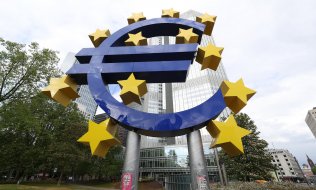The ECB has raised interest rates for the seventh time in a row in its bid to further curb inflation in the Eurozone.
31 Debates

31 Debates
The ECB has raised interest rates for the seventh time in a row in its bid to further curb inflation in the Eurozone.
Despite the
The ECB has followed the lead of the US Federal Reserve and the Bank of England and raised its key interest rate by another 0.5 percentage points in a bid to
In its biggest interest rate move since the introduction of the euro, the European Central Bank has raised its key interest rates by 0.75 percentage points to 1.25 percent. The bank's Governing Council already announced in the summer that it was
After a long delay, the European Central Bank has announced it is
The ECB's Governing Council has held an emergency meeting just one week after announcing an
After the US
ECB chief Christine Lagarde has admitted that the central bank underestimated
In contrast to the US Federal Reserve, which is raising interest rates, the ECB is sticking to its zero interest policy for the time being. ECB chief Christine Lagarde reiterated on Thursday that the current high
The inflation rate in the Eurozone climbed to 4.1 percent in October. Critics accuse the ECB of fueling this trend with its loose monetary policy, which involves pumping billions into money markets through bond purchases. ECB chief Christine Lagarde has now responded by calling for patience, saying that inflation will decline without intervention by the central bank.
Despite rising inflation, the European Central Bank is leaving the key interest rate at zero percent. ECB chief Lagarde is convinced that the current inflation trend is temporary and driven by high
Jens Weidmann, head of Germany's central bank the Bundesbank for more than a decade, is retiring at the end of the year for personal reasons. In Europe he was best known as a critic of the European Central Bank's loose monetary policy, especially under
EU Commission President Ursula von der Leyen is considering launching infringement proceedings against Germany. On May 5 the country's Federal Constitutional Court ruled that the ECB's
After eight years in office Mario Draghi stepped down as ECB president on Thursday. His successor is
The EU Parliament's Economics and Monetary Affairs Committee has recommended Christine Lagarde for the post of
In view of the bleak economic outlook and weak inflation, the ECB has decided to maintain the benchmark interest rate at the record low of zero percent at least until mid-2020. It also said it would consider buying bonds again if the inflation prospects worsen. Is this the right monetary policy for the times?
In view of a gloomy economic outlook and weak inflation European Central Bank chief Mario Draghi is considering adopting a more
The European Central Bank plans to cut its bond purchasing by half as of January. But at least until September 2018 it will continue to buy a maximum of 30 billion euros worth of bonds each month. The base interest rate has not been touched. Some commentators praise ECB chief Draghi for his cautious change of direction in monetary policy. For others it doesn't go far enough.
Emergency appeals against the purchase of government bonds have been rejected by Germany's Federal Constitutional Court. The plaintiffs wanted the court to stop Germany's central bank, the Bundesbank, from participating in the ECB's
The ECB will stick to its loose monetary policy for the time being, maintaining the benchmark interest rate at its record low of zero percent and leaving open the possibility of extending the bond-buying programme. ECB head Draghi justified the decision pointing to the euro's
Leading central bankers and economists from around the world are convening this week at their AGM at Jackson Hole in the US. Many of them are unsure whether to stick to the path of low interest rates and multi-billion programmes to buy up government bonds. Commentators have their own demands to make to the monetary policy makers.
ECB chief Mario Draghi has made it clear that the ECB has no intention of lowering interest rates even further after years of an
Inflation in the Eurozone rose considerably in December. The EU's statistical office Eurostat announced on Wednesday that consumer prices were 1.7 percent higher than a year ago. This is the highest rate of inflation since September 2013, prompting some journalists to call for an end to the ECB's
ECB chief Mario Draghi announced on Thursday that the
Mario Draghi has countered
Criticism of the ECB's zero interest rate policy is growing louder. Finance Minister Wolfgang Schäuble said on the weekend that the loose monetary policy was contributing to the growing popularity of the national-conservative AfD party in Germany. The press discusses the accusation and the effectiveness of the relaxed monetary policy.
The ECB's Governing Council is widely expected to unveil a large-scale plan for the purchase of government bonds at its meeting today, Thursday. The decision could further divide the Eurozone if the crisis states abandon austerity and prompt rich countries to end their solidarity, some commentators fear. Others see the plan as an important step towards pulling debt-ridden countries out of their financial misery.
Share prices soared on Thursday in reaction to the ECB's announcement that it will launch a multi-billion euro bond-buying programme. Meanwhile the euro dropped below 1.14 against the dollar. This trend will help the export trade, some commentators write jubilantly. Others see the Eurozone on its last legs now that the ECB has been forced to resort to the only instrument left at its disposal.
The ECB announced on Thursday that it would prolong its controversial bond-buying programme until March 2017. Because investors had expected an increase in the volume of monthly purchases, stock markets around the world slumped on Thursday. But the investors' disappointment is unjustified, commentators write, and doubt that Europe's economy can be saved with additional money.